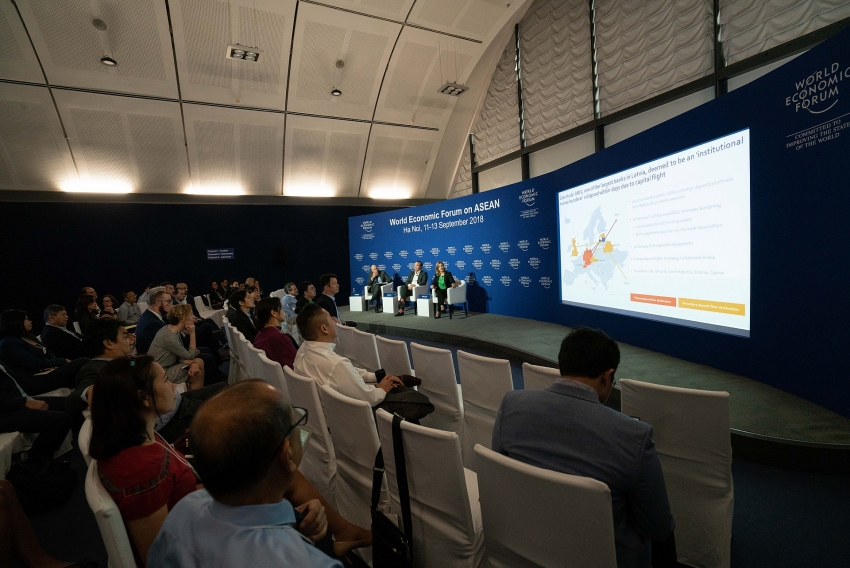WEF on ASEAN wrapped up with pledges on digital growth
Digital ASEAN, one of the World Economic Forum's (WEF) flagship initiatives in Southeast Asia, held two workshops during the meeting, convening 90 government ministers, business leaders, and policy-makers to set the goals for the year ahead.
 |
| The World Economic Forum on ASEAN has discussed co-operation in digital growth |
The initiative has five task forces focused on harmonising data policy and governance rules in the ASEAN; upgrading broadband access, quality, and speed; developing digital skills; improving co-operation for cybersecurity; and building a pan-regional e-payments ecosystem. Each task force now has a clear roadmap of goals to be achieved in the coming 12 months.
Prime Minister Nguyen Xuan Phuc and the Acting Minister of Information and Communications of Vietnam Nguyen Manh Hung built strong momentum for a “Flat ASEAN” by calling for the abolition of international roaming charges imposed on ASEAN citizens when travelling within the region, and the establishment of a regional ICT University to train a skilled workforce for the Fourth Industrial Revolution, as well as a Cybersecurity Information Sharing and Analysis Centre to ensure that all citizens and systems can be safely connected to the internet.
Envisioning a future defined by the Fourth Industrial Revolution, Hung underlined ASEAN nations’ need for “smart governance” and the willingness of governments, businesses, and societies to collectively adapt to rapid technological change.
“Technology can change very fast but the people and governments cannot change so fast and this will be our biggest challenge. So what do we need to do?” he said. “We have to train people so they are adept at change. They need not only technological training, but soft skills too. I think the Fourth Industrial Revolution is more like a mindset revolution.”
Among the first to make a digital skills pledge, Google announced it is deepening its commitment to train three million workers in small- and medium-sized enterprises across all 10 countries in Southeast Asia in digital skills by 2020.
Besides, given disparate levels of development and the potential for rapid development to leave some sectors of society behind, Anne-Birgitte Albrectsen, chief executive officer of the UK’s Plan International, reiterated the importance of equitable development and inclusion.
“There is no doubt that there is tremendous opportunity in the Fourth Industrial Revolution. What I would hope is that we can take some lessons from other revolutions because there were some very, very significant losers that got left out,” remarked Albrectsen, “We can learn from that and make sure that the social inclusion that is needed—and bringing everyone along—is a lot faster, and we need public policy to ensure we get that inclusion.”
One cause for great optimism, she elaborated, is the ASEAN’s “phenomenal investment in education,” which should translate into greater gender equity in the region’s future workforce. “As education has become more and more inclusive, as girls are superseding boys in attaining high levels of education, the economies are still not taking full advantage of this really fantastic resource of well-educated young women.”
What the stars mean:
★ Poor ★ ★ Promising ★★★ Good ★★★★ Very good ★★★★★ Exceptional
Related Contents
Latest News
More News
- Russian President congratulates Vietnamese Party leader during phone talks (January 25, 2026 | 09:58)
- Worldwide congratulations underscore confidence in Vietnam’s 14th Party Congress (January 23, 2026 | 09:02)
- Political parties, organisations, int’l friends send congratulations to 14th National Party Congress (January 22, 2026 | 09:33)
- 14th National Party Congress: Japanese media highlight Vietnam’s growth targets (January 21, 2026 | 09:46)
- 14th National Party Congress: Driving force for Vietnam to continue renewal, innovation, breakthroughs (January 21, 2026 | 09:42)
- Vietnam remains spiritual support for progressive forces: Colombian party leader (January 21, 2026 | 08:00)
- Int'l media provides large coverage of 14th National Party Congress's first working day (January 20, 2026 | 09:09)
- Vietnamese firms win top honours at ASEAN Digital Awards (January 16, 2026 | 16:45)
- ASEAN Digital Ministers' Meeting opens in Hanoi (January 15, 2026 | 15:33)
- ASEAN economies move up the global chip value chain (December 09, 2025 | 13:32)

 Tag:
Tag:
























 Mobile Version
Mobile Version